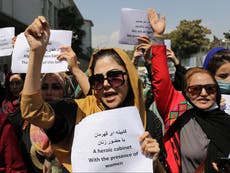Why the Taliban’s war on women is gravest women’s rights crisis in world, according to experts
‘We lost our freedom, we lost our jobs, we lost our status,’ Marzia Babakarkhail, Afghan activist, says
Your support helps us to tell the story
From reproductive rights to climate change to Big Tech, The Independent is on the ground when the story is developing. Whether it's investigating the financials of Elon Musk's pro-Trump PAC or producing our latest documentary, 'The A Word', which shines a light on the American women fighting for reproductive rights, we know how important it is to parse out the facts from the messaging.
At such a critical moment in US history, we need reporters on the ground. Your donation allows us to keep sending journalists to speak to both sides of the story.
The Independent is trusted by Americans across the entire political spectrum. And unlike many other quality news outlets, we choose not to lock Americans out of our reporting and analysis with paywalls. We believe quality journalism should be available to everyone, paid for by those who can afford it.
Your support makes all the difference.A year on from the Taliban seizing control of Afghanistan, the freedoms, lives and well-being of women in the country have been wrecked and ravaged.
From infringing girls’ right to education to ordering women to remain cooped up at home wherever possible, the full-throttle assault on women’s rights has steadily ramped up as the last year has progressed. After all, these are just two of many highly restrictive policies which directly target women.
Experts came together for a highly emotional event hosted by myself, Maya Oppenheim, The Independent’s Women’s Correspondent, to discuss the gruesome war the Taliban has waged on women since gaining power.
“There is no hope for women in Afghanistan,” Marzia Babakarkhail, one of the panellists, who previously worked as a family court judge in Afghanistan, told the audience.
Ms Babakarkhail, now an activist based in Manchester, noted Afghan women and girls had lost everything “overnight” as she warned her country is now “broken”.
She said every day she is in contact with women in Afghanistan who cry to her about their situation - adding the Taliban has become increasingly “dangerous” for women as each day goes by.
Ms Babakarkhail raised concerns about former judges who remain trapped in hiding from the Taliban in Afghanistan fearing for their lives as she called for Britons and others around the world to help them.
“I open my WhatsApp every morning, they are sending me the most hopeless text messages,” she said.
Watch the event in full below
Ms Babakarkhail has accused the Taliban of trying to kill her in Afghanistan in 1997 and again in Pakistan in 2007.
During this week’s discussion, the activist told viewers: “It is not easy to see your people is dying, being disrespected by the Taliban, we lost our freedom, we lost our jobs, we lost our status.”
The Taliban has escalated restrictions since seizing power of the Afghan capital, Kabul, in mid-August last year as US and British forces withdrew. The hardline Islamist group, which previously ruled the country, has blocked women from the workplace and education and barred them from taking part in all sports.
Heather Barr, another panellist, told viewers there was initially a great deal of discussion about the chance of a “Taliban 2.0”, with some clinging onto hopes the hardline Islamist group had changed during initial negotiations for US troops withdrawing from Afghanistan.
“The situation right now in Afghanistan is the most serious women’s rights crisis in the world and it is the most serious women’s rights crisis in the world since 1996 when the Taliban took over power the last time,” Ms Barr, associate director of the Women's Rights Division at Human Rights Watch, said.
The last time the Taliban ruled the country women were barred from working, girls were blocked from going to school, and women had to be chaperoned by a male relative if they wanted to leave the house.
Ms Barr noted there were “a lot of foreign diplomatics in Washington and other capitals” eager to believe the “Taliban’s promises” their attitude to women’s rights had altered and they now respected their right to employment and education.
“But there were another group of people who never believed any of the Taliban’s promises and those people were Afghan women,” she added.




Join our commenting forum
Join thought-provoking conversations, follow other Independent readers and see their replies
Comments